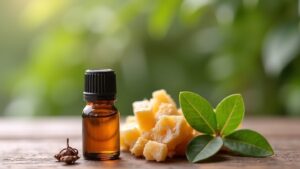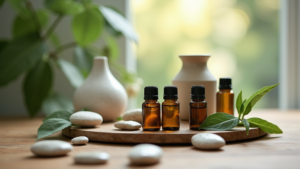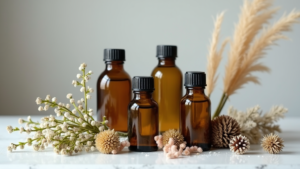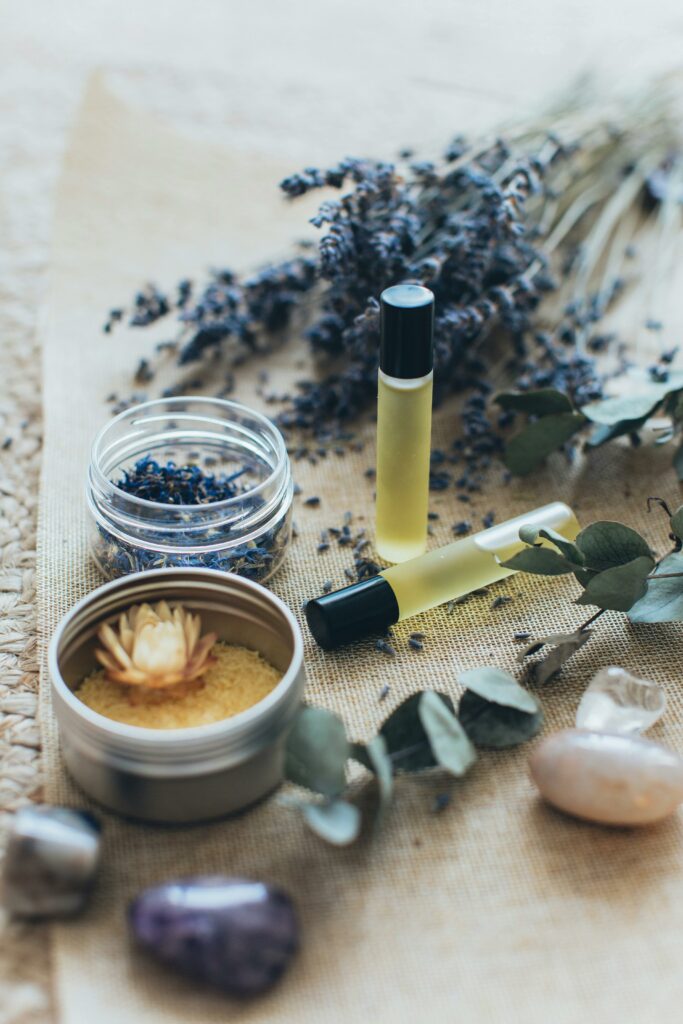Contents
Incorporating essential oils into your skincare routine can be a game-changer. These natural plant extracts are known for their ability to improve skin texture, combat common issues like acne or dryness, and enhance overall radiance. But with their potency comes the need for care and precision in their use. In this detailed guide, we’ll explore the best essential oils for skin care, their unique properties, and how to integrate them into your regimen safely and effectively.
Why Are Essential Oils Beneficial for Skin Care?
Essential oils are celebrated for their high concentration of bioactive compounds, which can offer therapeutic benefits for the skin. Derived through methods like steam distillation or cold pressing, these oils contain antioxidants, anti-inflammatory agents, and natural antibacterial compounds. Each essential oil has its unique properties that address specific skin concerns, whether it’s reducing acne, calming inflammation, or minimizing fine lines.
Using essential oils in skin care isn’t just about treating problems; it’s about nourishing the skin holistically. These oils can improve hydration, promote a youthful glow, and even help the skin recover from environmental damage. However, their concentrated nature means they must be used with care to avoid irritation or adverse reactions.
The Best Essential Oils for Skin Care
1. Lavender Essential Oil
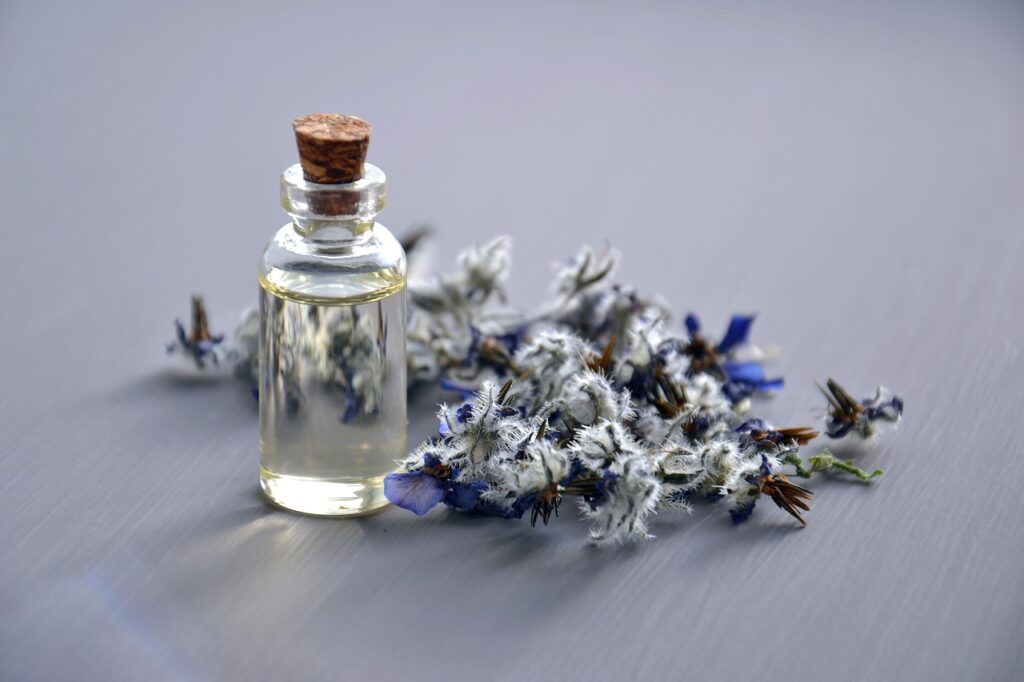
Lavender essential oil is a cornerstone in natural skin care. Its gentle yet powerful properties make it a versatile choice for nearly all skin types.
- Therapeutic Properties: Lavender oil is anti-inflammatory, antimicrobial, and soothing. These qualities make it excellent for calming irritated skin and supporting its natural healing processes.
- Skin Benefits: It reduces redness, alleviates dry patches, and accelerates the healing of minor cuts or burns. Lavender oil also combats stress, which can improve the overall appearance of your skin by reducing stress-induced breakouts.
- Best Suited For: Dry, sensitive, or acne-prone skin.
- How to Use: Mix 1-2 drops with a carrier oil such as jojoba or sweet almond oil. Apply directly to affected areas or add it to your nighttime moisturizer for a calming effect.
2. Tea Tree Essential Oil
Tea tree oil is widely recognized for its ability to combat acne and oily skin. It is a potent antibacterial agent, making it highly effective in targeting acne-causing bacteria.
- Therapeutic Properties: This oil is antimicrobial, antifungal, and antiseptic. It also has anti-inflammatory properties that help soothe active breakouts.
- Skin Benefits: Tea tree oil clears blemishes, reduces redness, and regulates sebum production, making it a popular choice for oily or combination skin types.
- Best Suited For: Acne-prone or oily skin.
- How to Use: Dilute 1-2 drops with a carrier oil before applying it to the skin. It works well as a spot treatment for pimples or inflamed areas.
3. Rose Essential Oil
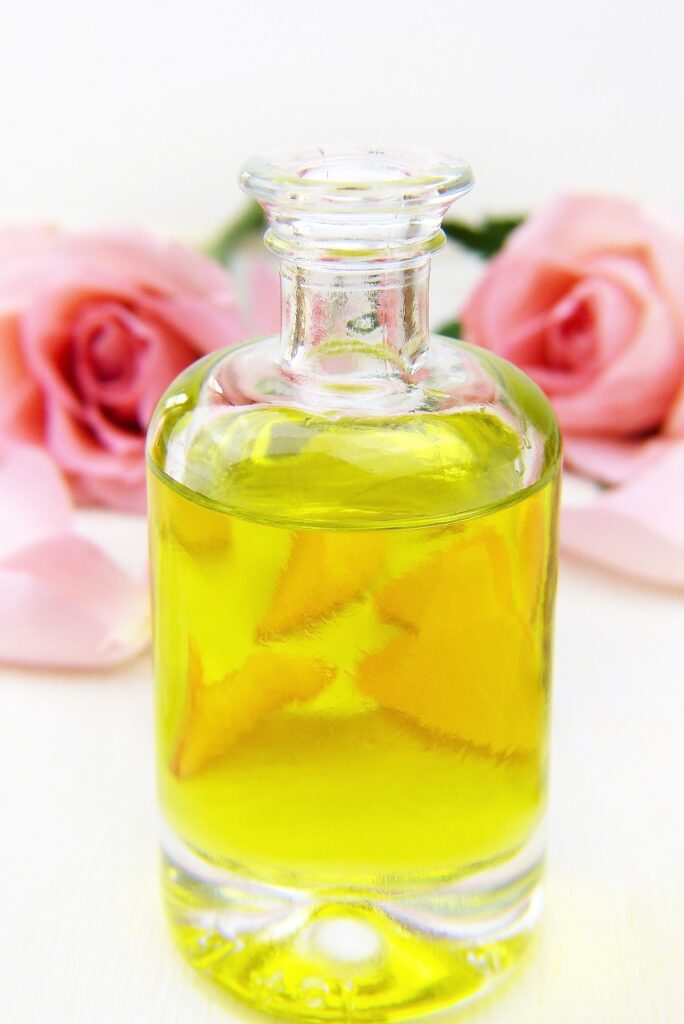
Rose essential oil is luxurious and deeply nourishing. It is particularly well-suited for mature or dry skin due to its hydrating and anti-aging properties.
- Therapeutic Properties: This oil is rejuvenating, hydrating, and soothing. It’s also packed with antioxidants that protect the skin from environmental stressors.
- Skin Benefits: Rose oil helps reduce the appearance of wrinkles, evens skin tone, and enhances elasticity. It also soothes dry, flaky skin, leaving it feeling plump and refreshed.
- Best Suited For: Dry, sensitive, or mature skin.
- How to Use: Add 1-2 drops to your daily moisturizer or mix it with a carrier oil for a nourishing facial serum.
4. Frankincense Essential Oil
Frankincense essential oil is often called the “king of oils” for its powerful anti-aging and skin-healing properties.
- Therapeutic Properties: It has antioxidant, anti-inflammatory, and astringent qualities that support healthy, youthful skin.
- Skin Benefits: Frankincense oil minimizes fine lines, tightens sagging skin, and reduces the appearance of scars and dark spots. It also promotes cell regeneration, making it an excellent choice for aging skin.
- Best Suited For: Aging or uneven skin tone.
- How to Use: Combine with a carrier oil like argan oil and apply it as part of your nightly skincare routine.
5. Chamomile Essential Oil
Chamomile essential oil is a soothing and calming option for sensitive or inflamed skin. It’s particularly helpful for conditions like eczema or rosacea.
- Therapeutic Properties: Known for its anti-inflammatory and calming properties, chamomile oil reduces irritation and promotes healing.
- Skin Benefits: It helps soothe redness, alleviate dryness, and speed up the recovery of irritated or damaged skin.
- Best Suited For: Sensitive, dry, or inflamed skin.
- How to Use: Dilute with a carrier oil and apply it to problem areas. Alternatively, add a drop to your favorite moisturizer.
6. Geranium Essential Oil
Geranium essential oil is prized for its balancing effect on the skin. It helps regulate oil production while improving overall skin elasticity.
- Therapeutic Properties: This oil is astringent, antibacterial, and balancing. It supports skin cell renewal and improves circulation.
- Skin Benefits: Geranium oil minimizes blemishes, tightens pores, and reduces the appearance of fine lines. It’s also effective in calming hormonal skin flare-ups.
- Best Suited For: Combination or oily skin.
- How to Use: Add a drop to your toner or blend it with a carrier oil for a lightweight, balancing serum.
7. Ylang Ylang Essential Oil
Ylang ylang essential oil is perfect for boosting skin radiance and regulating sebum production. It has a floral scent that also helps reduce stress.
- Therapeutic Properties: This oil is antiseptic, hydrating, and soothing. It helps balance oil production and promote hydration.
- Skin Benefits: Ylang ylang improves skin texture, evens out tone, and restores a natural glow.
- Best Suited For: Dull or combination skin.
- How to Use: Blend with your moisturizer or mix it into a carrier oil for a nourishing facial massage.
How to Safely Use Essential Oils on Skin
While essential oils offer remarkable benefits, using them safely is critical. Misuse can lead to irritation, sensitivity, or other adverse effects. Follow these guidelines to ensure proper application:
- Dilution: Essential oils are highly concentrated and must always be diluted with a carrier oil. Use a 1% dilution for facial applications (1 drop of essential oil per teaspoon of carrier oil). For more intensive treatments, a 2% dilution may be appropriate.
- Patch Test: Before using any essential oil on your face, perform a patch test on your inner forearm. This helps identify any allergic reactions or sensitivities.
- Avoid Photosensitivity: Some oils, especially citrus ones like lemon or bergamot, can make your skin more sensitive to the sun. If using these oils, apply them at night or ensure proper sun protection during the day.
- Storage: Keep essential oils in dark, airtight bottles and store them away from heat and sunlight to maintain their potency.
Best Carrier Oils for Skin Care
Carrier oils are essential for diluting essential oils and adding moisture to the skin. Choosing the right carrier oil can enhance the effectiveness of your essential oil blend. Here are some excellent options:
- Jojoba Oil: Mimics the skin’s natural sebum, making it suitable for all skin types.
- Rosehip Oil: Rich in vitamins A and C, it helps reduce scars and wrinkles.
- Sweet Almond Oil: Lightweight and nourishing, ideal for sensitive skin.
- Argan Oil: Deeply hydrating and perfect for dry or aging skin.
- Coconut Oil: Antibacterial and moisturizing, though it may not be ideal for acne-prone skin.
Tailoring Essential Oils to Your Skin Type
The best essential oil for your skin will depend on your unique needs. Here’s a quick guide:
- Oily/Acne-Prone Skin: Tea tree, geranium, or ylang ylang.
- Dry/Dehydrated Skin: Lavender, rose, or chamomile.
- Sensitive Skin: Chamomile, lavender, or frankincense.
- Aging Skin: Rose, frankincense, or geranium.
DIY Skincare Recipes with Essential Oils
- Hydrating Facial Serum: Combine 2 drops of rose oil, 1 drop of frankincense oil, and 2 teaspoons of argan oil.
- Calming Mist: Blend 5 drops of lavender oil with 1 cup of distilled water and a solubilizer. Use throughout the day to refresh your skin.
- Anti-Acne Spot Treatment: Mix 1 drop of tea tree oil with 1 teaspoon of jojoba oil and apply to blemishes.
Potential Adverse Effects
Although essential oils are natural, they are potent and can cause side effects if used improperly. Common adverse effects include:
- Skin Irritation: Redness, itching, or rash from undiluted oils.
- Allergic Reactions: Perform a patch test to minimize the risk.
- Photosensitivity: Citrus oils can increase sun sensitivity, leading to burns or pigmentation.
Discontinue use immediately if irritation occurs, and consult a dermatologist if symptoms persist.
The Science Behind Essential Oils
The benefits of essential oils for skin care are supported by research. For instance:
- Lavender Oil: Studies highlight its ability to reduce inflammation and promote wound healing.
- Tea Tree Oil: Clinical trials confirm its effectiveness against acne-causing bacteria.
- Frankincense Oil: Research shows it can improve skin elasticity and reduce signs of aging.
Evidence-based use ensures optimal results and safety.
Conclusion

Essential oils are a natural, effective way to enhance your skincare routine. From reducing acne to soothing sensitive skin and combating signs of aging, there’s an essential oil for every need. By choosing the right oils, diluting them properly, and using them consistently, you can achieve healthier, glowing skin. Always prioritize safety, and enjoy the transformative power of essential oils in your daily routine.
Related Articles
Related Products
Mental Health Issues Magazine click here
Mental Health Issues Magazine is your straight-talking guide to navigating the maze of modern mental health — without fluff, jargon, or pity. Written by someone who’s been there, this powerful collection of articles tackles everything from schizophrenia and anxiety to trauma, addiction, and gaslighting by the system. If you’re tired of sugar-coated wellness advice and want real-world insights from someone who has walked through the fire and lived to tell the tale, this is your companion on the road to understanding, resilience, and recovery.


